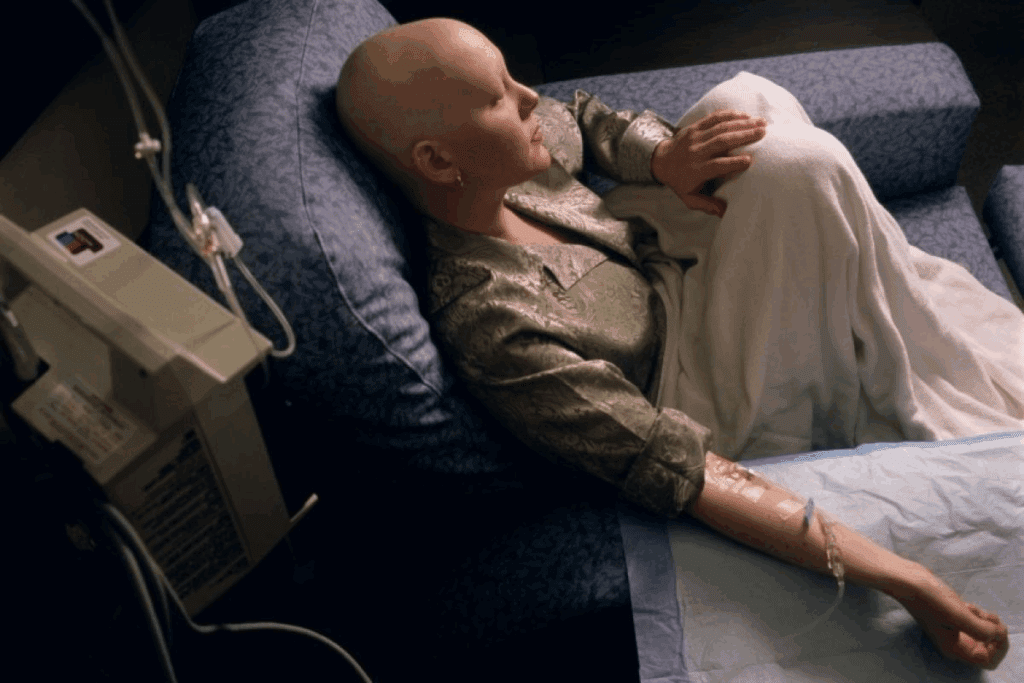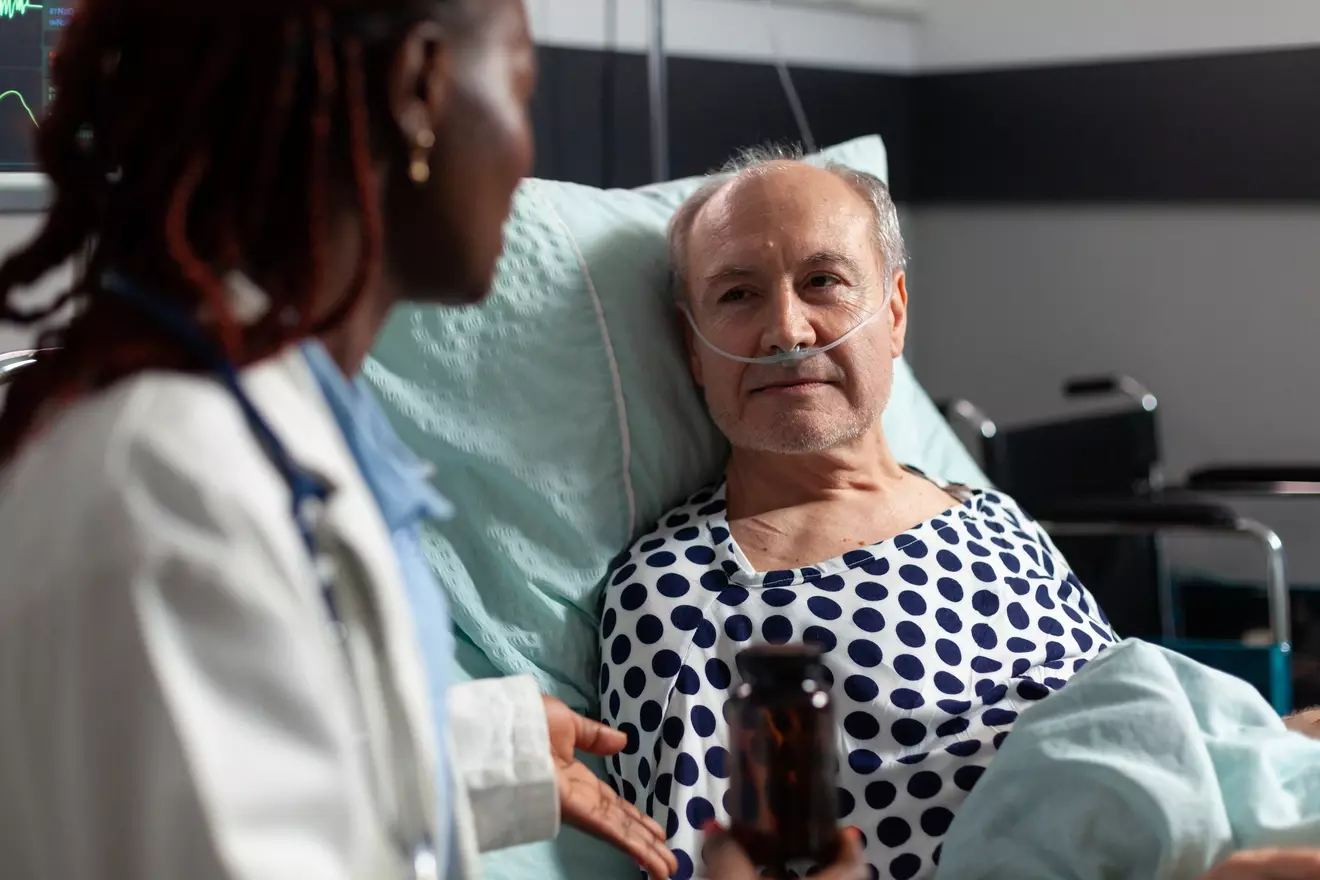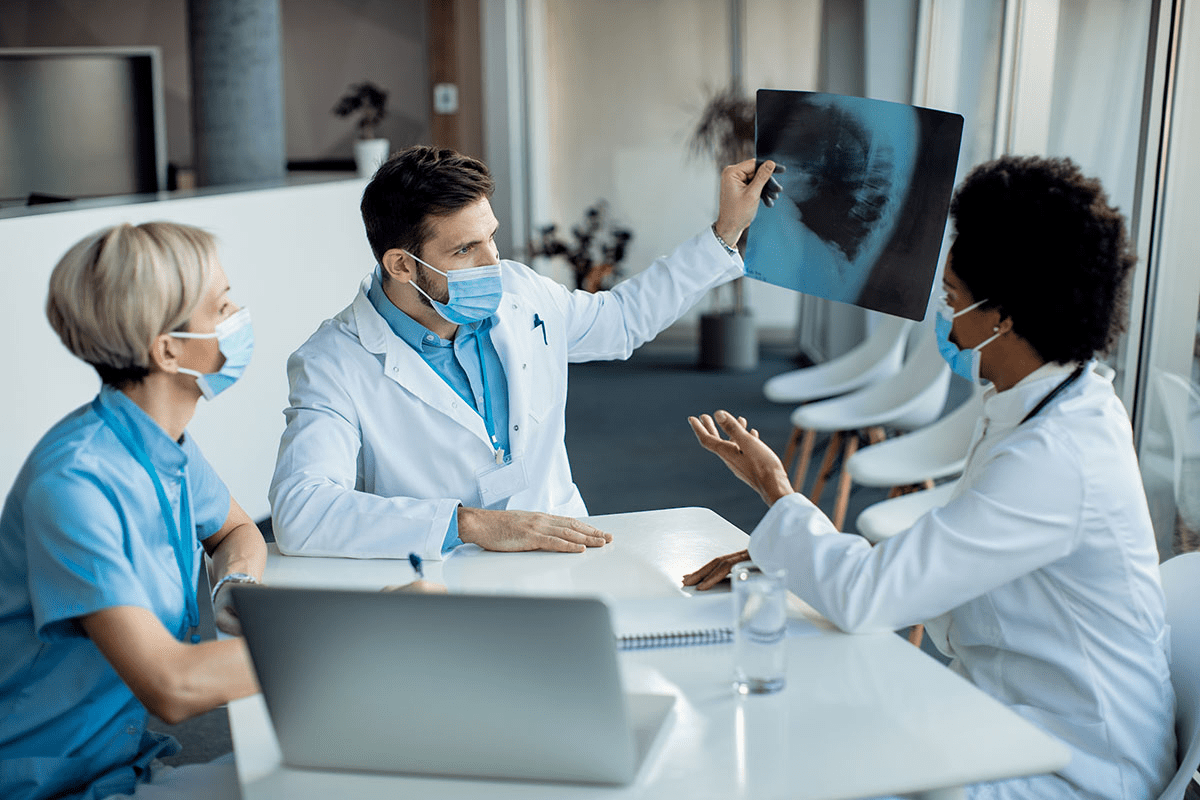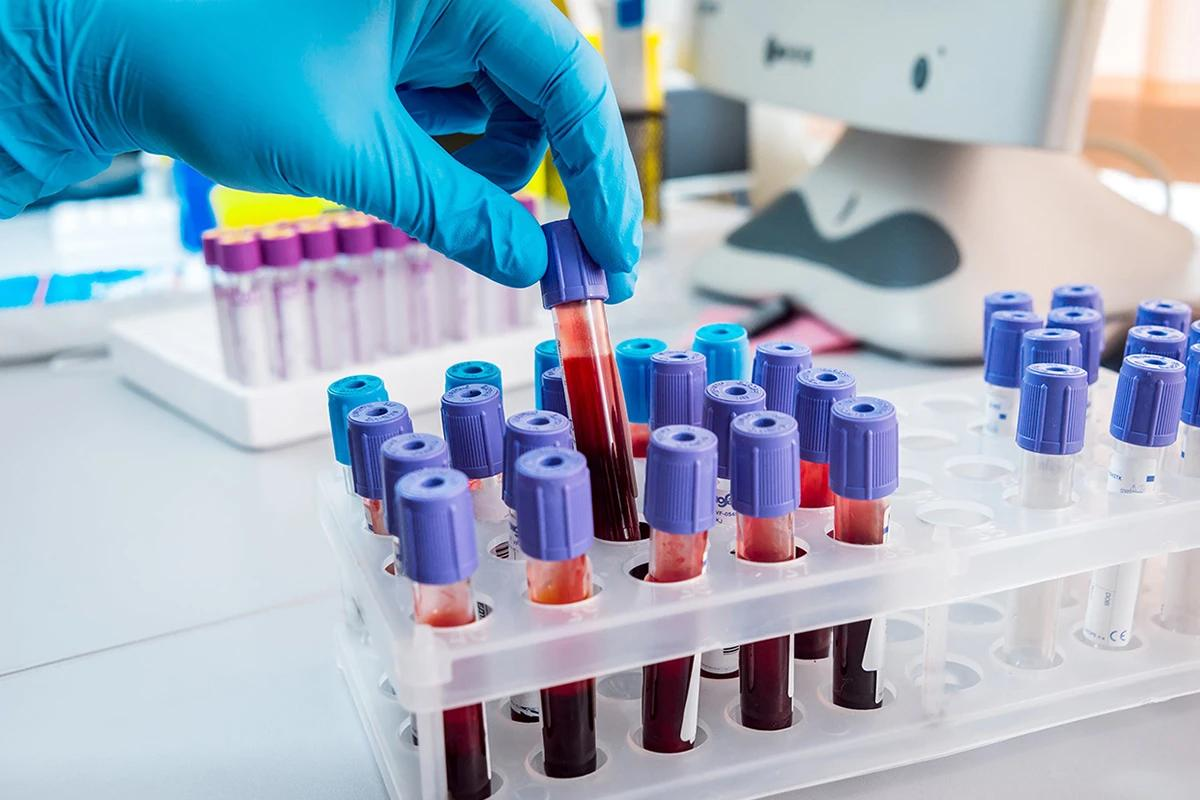Last Updated on November 26, 2025 by Bilal Hasdemir

Getting ready for your first chemotherapy session can feel overwhelming. But with the right help, you can make it easier and less scary.
We’ll show you how to get ready for your first chemotherapy session the night before. You’ll learn about mental and emotional preparation. Plus, get tips to make your treatment as comfortable as possible.
Make sure to get a good night’s sleep, drink plenty of water, and have a light meal. These steps can help you feel better during treatment. Our guide will help you face the challenges of chemotherapy with confidence.
Key Takeaways
- Understand what to expect during your first chemotherapy session
- Prepare mentally and emotionally for treatment
- Follow practical tips for a comfortable experience
- Stay hydrated and eat a light meal before treatment
- Get a good night’s sleep to help your body cope
Understanding Your First Chemotherapy Session

Getting ready for your first chemotherapy session can make you feel a mix of emotions. It’s normal to have questions about what to expect. Knowing what happens can help reduce anxiety and make you feel more in control.
Your care team is key in helping you through your chemotherapy treatment planning. Before your first visit, talk to a loved one or caretaker about your health history and current symptoms. This helps your healthcare providers understand your situation better.
What to Expect During Treatment
At your first chemotherapy session, you’ll have a consultation where your team will ask about your health history. This is important for making the chemotherapy infusion process fit your needs.
The treatment itself involves giving you chemotherapy drugs, which can take hours. You’ll be comfortable while the drugs are given through a vein. Our team will watch over you to make sure you’re safe and comfortable.
Common First-Time Concerns
Many patients worry about chemotherapy side effects, how long treatment will take, and how they’ll feel afterward. We know facing the unknown can be tough, but we’re here to support you.
Talking to your care team about your worries can help ease your fears. We aim to give you the info and support you need for your first chemo treatment with confidence.
Mental and Emotional Preparation Strategies

Getting ready for chemotherapy is a big step. It’s important to think about your mental and emotional health. This can really affect your experience.
Managing Anxiety and Fear
Feeling anxious or scared about chemotherapy is normal. Managing these feelings can make your experience better. Here are some tips:
- Seek professional help if you’re feeling really anxious
- Try relaxing activities like reading or listening to music
- Use deep breathing exercises to calm your mind
Having someone to talk to and support you can help a lot. This can make you feel less alone and anxious.
Mindfulness and Relaxation Techniques
Mindfulness helps you stay in the moment and worry less about the future or past. You can try:
- Meditation: Focus on your breath or a mantra to calm your mind
- Yoga: Mix physical movement with deep breathing for relaxation
- Progressive muscle relaxation: Release tension by relaxing different muscle groups
These methods can be adjusted to fit your comfort and energy levels. They’re great even on treatment days.
Talking with Family and Friends
Telling your loved ones about your feelings and needs can strengthen your support network. It’s important to:
- Be open about your fears and anxieties
- Ask for help when you need it, whether emotionally or practically
- Share your experiences to help them understand what you’re going through
Having a strong support system can greatly improve your chemotherapy journey.
| Support Strategy | Description | Benefits |
| Professional Counseling | One-on-one therapy sessions | Personalized emotional support, coping strategies |
| Support Groups | Group meetings with others undergoing chemotherapy | Shared experiences, community, understanding |
| Family and Friends | Emotional and practical support from loved ones | Reduced feelings of loneliness, practical help |
Essential Chemo Preparation Steps the Day Before
The day before your chemotherapy is a great time to calm down and get ready. It’s important to make sure you’re both physically and mentally ready for what’s coming.
Creating Your Pre-Treatment Routine
Having a pre-chemo routine can make you feel more in control. Start with relaxing activities like meditation, reading, or a warm bath. Getting enough rest is also key, as chemo can make you very tired. Try to sleep for 7-8 hours to help your body handle the treatment better.
To set up a good routine, think about these steps:
- Plan your day based on how much energy you have, avoiding hard activities.
- Do things that make you feel calm and relaxed.
- Try gentle stretches or yoga to reduce stress.
Last-Minute Arrangements
Getting things ready the day before can help you feel less stressed. Make sure you have all your important documents, like insurance cards and ID, ready. Check your chemotherapy bag to make sure it has everything you need, like comfy clothes, things to do, and snacks.
Here are some important last-minute tasks:
- Make sure you have a way to get to and from the treatment center.
- Let your loved ones know when you’ll be getting treatment.
- Get your home ready for when you get back by stocking up and cooking meals ahead of time.
Mental Reset Techniques
Getting your mind ready is just as important as getting your body ready. Using mental reset techniques can help you deal with anxiety and stay focused. Deep breathing, visualization, and mindfulness meditation are great options.
To use mental reset techniques well, try these:
- Make time for mindfulness practices.
- Use apps or videos to help you meditate.
- Keep a journal to write down your thoughts and feelings.
By focusing on these key steps, you can make your chemotherapy experience easier and less stressful. Being well-prepared is crucial for managing your treatment well.
What to Eat the Night Before Chemotherapy
Nutrition is key in your chemotherapy journey, starting with the night before. Eating well can reduce side effects and boost your health during this time.
Recommended Foods for Pre-Chemo Nutrition
Choose foods that are easy to digest and full of nutrients. Lean proteins like chicken, fish, and eggs keep you strong. Complex carbohydrates from whole grains, fruits, and veggies give you energy and fiber. Add foods rich in antioxidants, like berries and leafy greens, to protect your cells.
Here are some meal ideas:
- Grilled chicken with quinoa and steamed vegetables
- Salmon with brown rice and a side salad
- Lentil soup with whole-grain bread
Foods to Avoid Before Treatment
Knowing what not to eat is just as crucial. High-fat foods are hard to digest and may upset your stomach. Also, avoid spicy or acidic foods that can irritate your stomach. Steer clear of foods high in sugar to prevent energy crashes.
Hydration Guidelines
Drinking enough water is vital before, during, and after chemotherapy. Drink plenty of water the day before and after treatment to flush out the meds. Aim for eight glasses of water a day. If you’re active or live in a hot place, drink more.
You can also eat hydrating foods like watermelon, cucumbers, and celery. Check your urine color to see if you’re drinking enough; it should be light yellow or clear.
Getting a Good Night’s Sleep Before Treatment
Sleep is key to fighting off chemotherapy’s effects. It helps your body handle the treatment better. Getting enough rest before treatment can make a big difference in how you feel.
Creating a Restful Environment
To sleep well, make your bedroom a sleep haven. Here are some tips:
- Keep your bedroom cool, dark, and quiet.
- Invest in a comfortable mattress and pillows.
- Use blackout curtains or an eye mask if necessary.
- Minimize noise with earplugs or a white noise machine.
Sleep Aids and Techniques
There are many ways to improve your sleep. Try these:
- Relaxation techniques such as deep breathing or meditation.
- Progressive muscle relaxation to release tension.
- Mindfulness practices to calm your mind.
- Aromatherapy with calming scents like lavender.
Managing Pre-Treatment Insomnia
Insomnia can be tough before chemotherapy. Here are some tips to help:
| Strategy | Description |
| Establish a bedtime routine | Develop a calming pre-sleep routine to signal your body that it’s time to rest. |
| Limit screen time before bed. | Avoid screens for at least an hour before bedtime to reduce blue light exposure. |
| Stay active during the day. | Regular physical activity can help improve sleep quality, but avoid vigorous exercise close to bedtime. |
By using these tips, you can sleep better before chemotherapy. This will help your body get ready for treatment.
What to Wear to Chemotherapy
Choosing the right clothes for your chemotherapy session is key to feeling comfortable. We know that feeling at ease is important during this time. Your clothes can make a big difference in your experience.
Comfortable Clothing Options
For chemotherapy, wearing comfy clothes is a must. Go for loose, comfy clothes like leggings or loose pants. These make it easy to access your arm or the treatment area. Slip-on shoes and cozy socks also help you relax.
- Soft, breathable fabrics
- Loose-fitting tops and bottoms
- Easy-to-wear clothing with minimal buttons or zippers
Practical Considerations for Treatment Day
Being practical is as important as being comfy when picking out your chemotherapy outfit. Pick clothes that let the medical staff easily give you treatment. A zip-up sweater or a button-down shirt works well.
- Wear clothes that are easy to remove and put back on.
- Choose clothing with minimal jewelry to avoid any complications.
- Dress in layers for potential temperature changes.
Layering Strategies for Temperature Changes
Chemotherapy rooms can be cold or warm, so layering is smart. Bringing an extra layer, like a light blanket or a sweater, helps too.
“Dressing in layers helped me adjust to the temperature changes during my chemotherapy sessions. It made a big difference in my comfort level.”
— Patient Feedback
By following these tips and picking the right clothes, you can feel better during chemotherapy. Remember, your comfort matters, and the right clothes can make your experience better.
Essential Items to Pack in Your Chemo Bag
A well-prepared chemo bag can help reduce stress and make your treatment more manageable. It’s important to bring items that will keep you comfortable, entertained, and energized. This makes your treatment sessions easier to handle.
Entertainment and Distraction Items
Bringing entertainment and distraction items can help pass the time. It also takes your mind off the treatment. Consider packing:
- Books or e-readers
- Tablets loaded with your favorite shows or movies
- Knitting or other crafts
- Podcasts or audiobooks
- Crossword puzzles or other games
Comfort Items for Treatment Sessions
Comfort items can make a big difference in your treatment experience. Some suggestions include:
- A soft blanket or pillow
- Comfortable clothing and layers for temperature control
- Slippers or comfortable shoes
- Eye masks or earplugs for better rest
Snacks and Beverages to Bring
Staying hydrated and energized is crucial during chemotherapy. Pack:
- Water and other hydrating beverages
- Nutritious snacks like nuts, fruits, or energy bars
- Avoid foods that are high in sugar, salt, or fat
Technology and Charging Needs
With the amount of time you’ll spend at the treatment center, it’s vital to keep your devices charged. Don’t forget:
- Phone chargers and portable power banks
- Headphones or earbuds
- Laptops or tablets for work or entertainment
By packing these essential items, you can make your chemotherapy experience more comfortable and less stressful. Always check with your treatment center for any specific items they recommend or prohibit.
Preparing Your Home for Post-Treatment Recovery
To make your recovery comfortable and stress-free, prepare your home before treatment. This preparation can greatly help your healing and well-being after chemotherapy.
Setting Up a Comfortable Recovery Space
Having a cozy recovery space is key to rest and relaxation. Choose a quiet spot in your home for this purpose. It should have a comfy bed, pillows, and blankets for good rest.
Tips for a Comfortable Recovery Space:
- Keep the room at a comfortable temperature.
- Use soft lighting to create a calming ambiance.
- Minimize clutter to reduce stress.
Meal Preparation and Food Storage
Preparing meals ahead of time saves energy and keeps you nourished. Cook meals that are easy to reheat and store them in labeled containers. Having non-perishable items and easy snacks is also helpful.
| Meal Type | Preparation Tips | Storage Suggestions |
| Soups and Stews | Cook in bulk, portion into individual servings | Refrigerate or freeze in airtight containers |
| Casseroles | Prepare ahead, bake when needed | Store in refrigerator, reheat as needed |
| Snacks | Prepare fruit, cheese, and crackers | Store in easy-to-access containers |
Organizing Medications and Supplies
It’s important to organize your medications and medical supplies for a smooth recovery. Set up a special area for your meds, use a pill organizer, and keep a list of your medications. Make sure you have all the necessary supplies, like bandages and thermometers, within reach.
Remember, a well-organized home can significantly reduce stress and support your recovery.
Transportation Planning for Chemotherapy Appointments
Planning how to get to and from chemotherapy is key. A reliable way to travel can lower your stress. It lets you focus on getting better.
Arranging Rides to and from Treatment
Having someone drive you to your first treatment is a good idea. It keeps you safe and offers emotional support. If you need a ride, talk to your treatment center’s social worker or navigator. They can help with ride-sharing or other local options.
When setting up rides, think about a few things:
- Make sure the driver knows the treatment schedule and any special needs.
- Work with family or friends to find someone to drive you.
- Look into community resources or services for medical appointment rides.
What to Consider if Driving Yourself
If you’re driving yourself, think about your health on treatment days. Chemotherapy can make you tired or dizzy. This might affect your driving.
Here are some tips for driving to treatment:
- Have a plan B if you can’t drive home.
- Keep your gas tank full and have a reliable car.
- Try to avoid driving during busy times or heavy traffic.
Also, check the parking at your treatment center. Plan ahead to reduce stress on your appointment day.
Personal Hygiene and Skin Care Before First Chemo
Before starting chemotherapy, it’s key to focus on personal hygiene and skin care. This helps prevent infections and keeps you ready for treatment.
Bathing Practices
On the day before chemotherapy, stick to your usual bath routine. Use mild soap and lukewarm water. Stay away from harsh or scented soaps that can irritate your skin.
Recommended bathing tips:
- Use gentle, fragrance-free cleansers.
- Avoid extreme water temperatures.
- Pat your skin dry instead of rubbing vigorously.
Skin Preparation Guidelines
Good skin care before chemotherapy can lower the risk of skin reactions. Keep your skin moisturized, but don’t apply lotions or creams right before treatment.
| Skin Care Tip | Benefit |
| Moisturize regularly | Reduces dryness and irritation |
| Avoid harsh products | Minimizes skin reaction risk |
| Stay hydrated | Helps maintain skin health |
Dental Care Considerations
Talking to your healthcare provider about dental care before chemotherapy is important. Good oral hygiene helps prevent infections and complications during treatment.
“Maintaining good oral health is an essential part of your overall care before, during, and after chemotherapy.” – American Cancer Society.y
By focusing on personal hygiene, skin care, and dental health, you can prepare well for chemotherapy. This supports your overall well-being during your treatment journey.
Medication Management Before Treatment Day
Managing your medications well is key to your safety and treatment success. Before your first chemotherapy session, it’s important to know how to handle your meds.
Discussing Current Medications with Your Doctor
Talk openly with your doctor about all your medications. This includes prescription drugs, over-the-counter meds, vitamins, and supplements. Your doctor needs this info to:
- Check for any bad interactions with your chemotherapy drugs.
- Change dosages or switch meds to lower risks.
- Make sure your current meds won’t mess with your treatment.
Make a list of all your medications and go over it with your doctor to avoid problems.
Medications to Avoid Before Chemotherapy
Some meds might need to be stopped or changed before starting chemo. These include:
- Blood thinners, which could raise the risk of bleeding.
- Certain antibiotics or antifungal meds might interact with chemo.
- Herbal supplements that could affect your treatment or recovery.
Always check with your doctor before stopping or changing any medication.
Pre-Treatment Prescriptions to Fill
Your doctor might give you extra meds to manage chemo side effects or get ready for treatment. These could be:
- Anti-nausea meds to prevent or lessen nausea and vomiting.
- Growth factors to help your blood cell count.
- Medications to prevent infections.
Make sure to fill these prescriptions before your treatment day. Also, know how to take them as directed.
By managing your medications well before your first chemo session, you can make the treatment smoother. Always listen to your doctor and ask questions if you’re unsure about your medication management.
Setting Up Your Support System
A strong support system is key for those going through chemotherapy. It offers both emotional and practical help. As you get ready for treatment, building a network that supports you is crucial.
Communicating Your Needs to Family and Friends
Talking openly with your loved ones is the first step. Discuss what you need, like help with chores or emotional support. Being clear helps your family and friends know how to assist you best.
Make a list of tasks you’d like help with. This could be grocery shopping or driving you to appointments. It helps your loved ones feel involved and useful.
Finding Support Groups and Resources
Support groups and resources are also important. They offer a chance to connect with others facing similar challenges. You can share advice and get emotional support.
There are many support groups, both in-person and online. Organizations focused on cancer support also provide help. They offer educational materials and counseling.
| Type of Support | Description | Benefits |
| In-person Support Groups | Meetings where patients and survivors share their experiences. | Face-to-face interaction, emotional support. |
| Online Support Groups | Virtual communities on forums or social media. | Accessibility, 24/7 support, anonymity. |
| Cancer Support Organizations | Entities providing resources, education, and counseling. | Comprehensive support, educational materials, and professional guidance. |
Creating a Communication Plan
Having a communication plan is essential. It helps you stay in touch with your support system. Decide how and when to contact your loved ones and healthcare providers.
Choose your preferred communication methods, like phone calls or text messages. Set a routine for updates. This keeps everyone informed without stress.
By setting up a strong support system, talking openly, finding groups, and planning how to communicate, you can face chemotherapy with more confidence and less stress.
Financial and Insurance Preparations
Getting ready for your first chemotherapy session means thinking about money. Chemotherapy can cost a lot, but being ready can make things easier. It helps you focus on getting better.
Understanding Your Coverage for Chemotherapy
First, learn what your insurance covers for chemotherapy. Look at your policy to see what’s included and what’s not. Contact your insurance provider to clear up any questions. This includes deductibles, copays, and any extra costs.
It’s also important to know the difference between medically necessary and experimental or investigational treatments. This can affect your coverage.
| Insurance Aspect | Description | Action Required |
| Deductibles | The amount you must pay before insurance coverage kicks in. | Review your policy to understand the deductible amount. |
| Copays | Fixed amounts you pay for each treatment or service. | Check if your copays are different for chemotherapy sessions. |
| Out-of-Pocket Maximum | The maximum amount you pay annually for healthcare expenses. | Understand what counts towards this maximum. |
Preparing for Potential Costs
It’s smart to think about other costs besides insurance. This includes travel to and from treatment, lost income, and extra expenses not covered by insurance.
Make a budget or financial plan to handle these costs. Talk to a financial advisor who knows about medical expenses.
Resources for Financial Assistance
There are many ways to get financial help for chemotherapy. Organizations offer help with medication, travel, and living costs.
Patient advocacy groups and non-profit organizations focused on cancer support are great resources. Look them up and ask for help.
By knowing your insurance, planning for costs, and finding financial help, you can manage chemotherapy’s financial side. This makes it easier to focus on your treatment and recovery.
Work and Life Responsibilities: Making Arrangements
Getting ready for chemotherapy is more than just medical prep. You also need to organize your daily life. Since your work and life don’t stop during treatment, making plans is crucial.
Communicating with Your Employer
Tell your employer about your treatment schedule. This way, you can adjust your work. Talk to your HR or supervisor about leave and flexible work options. Be ready to show your doctor’s notes to support your request.
Arranging for Childcare or Pet Care
If you have kids or pets, finding care for them is key. You might ask family or friends for help, or look into professional services. Have a backup plan if your main caregiver can’t make it.
Managing Household Responsibilities
Household chores can be tough during chemo. Make a list of tasks and share them with family or friends. You could also hire professionals for cleaning or lawn care.
By planning ahead, you can focus on getting better. Good planning and talking to others are important during this tough time.
Conclusion: Approaching Your First Chemotherapy with Confidence
As you get ready for your first chemotherapy session, we hope this guide has helped. It’s packed with tips to make your treatment smooth and stress-free. By following these steps, you can make your experience better.
Understanding your treatment and taking care of your health are key. We’ve covered important topics like setting up a pre-treatment routine and building a support system. These will help you feel more ready.
For your last tips, stay positive and ask your healthcare team any questions. You’ve already taken a big step by learning about your treatment. Now, you’re ready to face it with confidence.
It’s not just about the treatment; it’s also about taking care of yourself. With the right mindset and preparation, you can successfully go through this journey.
FAQ
What should I eat the night before chemotherapy?
Eat a balanced meal with lean proteins, complex carbs, and healthy fats. Avoid heavy, greasy, or spicy foods. They can make you uncomfortable during treatment.
How can I manage anxiety and fear before my first chemotherapy session?
Use mindfulness and relaxation techniques like deep breathing, meditation, or yoga. Talking to family and friends can also offer emotional support.
What should I bring to my chemotherapy appointment?
Bring entertainment, comfort items, snacks, and drinks. Don’t forget your tech and charging cables.
How can I prepare my home for post-treatment recovery?
Create a comfy recovery space and prep meals ahead. Organize your meds and supplies for a smooth healing process.
What are the recommended bathing practices before chemotherapy?
Take a warm bath with mild soap. Avoid harsh products. Dry well, especially in moist areas.
How can I manage my medications before chemotherapy?
Talk to your doctor about your meds. Avoid interactions with chemotherapy. Fill any needed prescriptions.
What should I wear to chemotherapy?
Wear comfy, loose clothes for easy access. Layer for temperature changes.
How can I arrange transportation to and from chemotherapy appointments?
Use rides from family or friends, or transportation services. Having someone drive you can help.
What are the financial preparations I should make for chemotherapy?
Know your insurance and prepare for costs. Look for financial help to reduce stress.
How can I manage work and life responsibilities during chemotherapy?
Talk to your employer and arrange for childcare or pet care. Manage your home to reduce stress.
How do I flush chemotherapy out of my body?
Drink lots of water and eat well. Follow your doctor’s advice for elimination.
What are the steps to prepare for chemotherapy?
Create a routine, make arrangements, and practice mental reset. Prepare physically and mentally.
What are the tips for my first chemotherapy treatment?
Be prepared, have support, and follow your team’s instructions. It can make your first treatment less stressful.
References
- Lai, J., Sun, M., Ye, J., & Xu, Y. (2024). Pre-treatment assessment of chemotherapy for cancer patients: A standardized content framework. Journal of Oncology Nursing, XX(X), XX–XX. https://www.ncbi.nlm.nih.gov/pmc/articles/PMC11088226/
- Bognár, S. A., et al. (2024). Psychological intervention improves quality of life in patients with cancer: A systematic review and meta-analysis. Scientific Reports, 14(1), Article 63431. https://www.nature.com/articles/s41598-024-63431-y






